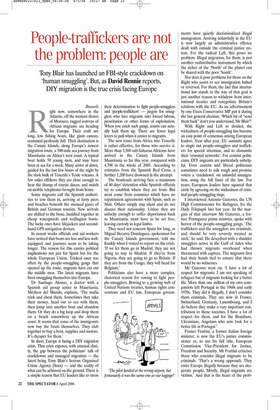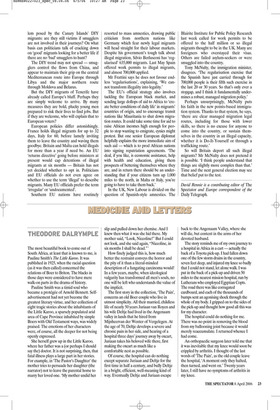People-traffickers are not the problem: people are
Tony Blair has launched an FBI-style crackdown on ‘human smuggling’. But, as David Rennie reports, DIY migration is the true crisis facing Europe
Brussels
Right now, somewhere in the Atlantic, off the western shores of Morocco, ragged convoys of African migrants are heading for Europe. Their craft are long, low fishing boats, like giant canoes, crammed perilously full. Their destination is the Canary Islands, along Europe’s newest migration route, a 500-mile sea journey from Mauritania on Africa’s west coast. A typical boat holds 50 young men, and may have been at sea for a week. Many arrive at dawn, guided for the last few hours of the night by the dark bulk of Tenerife’s Teide volcano. A few miles offshore they are close enough to hear the thump of tourist discos, and switch on mobile telephones brought from home.
Some migrants call the Spanish authorities to tow them in, arriving at ferry piers and beaches beneath the stunned gazes of British and German tourists. New arrivals are chilled to the bone, huddled together in cheap waterproofs and wellington boots. The lucky ones have lifejackets and secondhand GPS navigation devices.
In recent weeks officials and aid workers have noticed that boats are less and less wellequipped, and journeys seem to be taking longer. The reason for this carries political implications not just for Spain but for the whole European Union. Tricked once too often by the people-smuggling gangs that opened up the route, migrants have cut out the middle men. The latest migrants have been smuggling themselves into Europe.
Dr Santiago Alonso, a doctor with a Spanish aid group active in Mauritania, Médicos del Mundo, explains, ‘The mafia trick and cheat them. Sometimes they take their money, head out to sea with them, then jump into another boat and abandon them. Or they do a big loop and drop them on a beach somewhere up the African coast. It seems that some of the immigrants now buy the boats themselves. They club together to buy a boat, supplies and motors. It’s cheaper for them.’ In short, Europe is facing a DIY migration crisis. That crisis exposes, with unusual clarity, the gap between the politicians’ talk of crackdowns and managed migration — the latest being Tony Blair’s Serious Organised Crime Agency (Soca) — and the reality of what can be achieved on the ground. There is a simple reason that EU leaders like to stress their determination to fight people-smugglers and ‘people-traffickers’ — jargon for smugglers who lure migrants into forced labour, prostitution or other forms of exploitation. When you catch such gangs, courts can actually lock them up. There are fewer legal levers to pull when it comes to migrants.
The new route from Africa into Tenerife is rather effective, for those who survive it. More than 3,500 sub-Saharan Africans have arrived in the Canary Islands from Mauritania so far this year, compared with 4,700 in the whole of 2005. According to estimates from the Spanish Red Cross, a further 1,200 have drowned in the attempt.
The boatloads arriving face a maximum of 40 days’ detention while Spanish officials try to establish where they are from. But most come from countries which have no repatriation agreements with Spain, such as Mali. Others simply stay silent and do not discuss their nationality. Unless they are unlucky enough to suffer deportation back to Mauritania, most have to be set free, leaving custody in legal limbo.
They need not concern Spain for long, as Miguel Becarra Domínguez, spokesman for the Canary Islands government, told me frankly when I visited to report on the crisis. ‘If we let them go in Madrid, they are not going to stay in Madrid. If they’re from Nigeria, they are going to go to Britain. If they are from the Congo, they will head for Belgium.’ Politicians also have a more complex, rhetorical reason for vowing to fight people-smugglers. Bowing to a growing web of United Nations treaties, human rights conventions and EU law, European govern ments have quietly decriminalised illegal immigration. Arriving unlawfully in the EU is now largely an administrative offence dealt with outside the criminal justice system. For the radical Left, this poses no problem. Illegal migration, for them, is just another redistributive instrument by which the riches of the ‘North’ of the planet can be shared with the poor ‘South’.
Nor does it pose problems for those on the Right who yearn to see immigration halted or reversed. For them, the fact that international law stands in the way of that goal is just another reason to withdraw from international treaties and renegotiate Britain’s relations with the EU. As an advertisement by one Essex Conservative MP put it during the last general election, ‘Which bit of “send them back” don’t you understand, Mr Blair?’ With Right and Left so divided, the wickedness of people-smuggling has become an easy point of consensus among European leaders. Year after year, EU summits agree to single out people-smugglers and traffickers for special attention, and to dismantle their ‘criminal networks’. For centrist politicians, DIY migrants are particularly unhelpful. Even centrist and liberal politicians sometimes need to talk tough and promise voters a ‘crackdown’ on unlawful immigration, using the full force of the law. For years, European leaders have squared that circle by agreeing on the wickedness of criminal people-smuggling rings.
I interviewed Antonio Guterres, the UN High Commissioner for Refugees, for the Daily Telegraph late last year. In the margins of that interview Mr Guterres, a former Portuguese prime minister, spoke with horror of the people-smuggling gangs. ‘The traffickers and the smugglers are criminals, and should be very severely treated as such,’ he said. He described with a shudder smugglers active in the Gulf of Aden who had thrown migrants overboard when threatened with capture. The migrants first had their hands tied to ensure that there would be no witnesses.
Mr Guterres went on, ‘I have a lot of respect for migrants; I am not speaking of refugees but of migrants looking for a better life. More than one million of my own compatriots left Portugal in the 1960s and early 1970s. They did it illegally, I don’t consider them criminals. They are now in France, Switzerland, Germany, Luxembourg, and I do believe they make a very important contribution to those societies. I have a lot of respect for them, and for the Brazilians, Ukrainians, Angolans who now look for a better life in Portugal.’ Franco Frattini, a former Italian foreign minister, is now the EU’s justice commissioner or, to use his full title, European Commission Vice-President for Justice, Freedom and Security. Mr Frattini criticises those who consider illegal migrants to be criminals. ‘That’s a wrong approach. They enter Europe illegally because they are desperate people. Mostly, illegal migrants are victims.’ And that is the heart of the prob lem posed by the Canary Islands’ DIY migrants: are they still victims if smugglers are not involved in their journeys? On what basis can politicians talk of cracking down on ‘good’ migrants looking for a better life if there are no ‘bad’ smugglers to hunt?
The DIY trend may not spread — smugglers control the flows from China, and appear to maintain their grip on the central Mediterranean route into Europe through Libya and the major northern route through Moldova and Belarus.
But the DIY migrants of Tenerife have already called Europe’s bluff. Perhaps they are simply welcome to arrive. By many measures they are bold, plucky young men prepared to risk their lives to find jobs. But if they are welcome, who will explain that to European voters?
European policies differ astonishingly. France holds illegal migrants for up to 32 days, Italy for 60, before lamely inviting them to leave the country and waving them goodbye. Britain and Malta can hold illegals for more than a year if need be. An EU ‘returns directive’ going before ministers at present would cap detentions of illegal migrants at six months — Britain has not yet decided whether to opt in. Politicians and EU officials do not even agree on whether to use the term ‘illegal’ to describe migrants. Many EU officials prefer the term ‘irregular’ or ‘undocumented’.
Southern EU nations have routinely resorted to mass amnesties, drawing public criticism from northern nations like Germany which fear newly legal migrants will head straight for their labour markets. Despite his government’s tough talk about illegal migration, Silvio Berlusconi has ‘regularised’ 635,000 migrants. Last May Spain offered work permits to illegal migrants, and almost 700,000 applied.
Mr Frattini says he does not favour endless ‘regularisations’, explaining, ‘We cannot transform illegality into legality.’ The EU’s official strategy also involves tackling the European black market, and sending large dollops of aid to Africa to ‘create better conditions of daily life’ in migrants’ countries of origin, and to encourage transit nations like Mauritania to shut down migration routes. It could take some time for aid to raise African incomes high enough for people to stop wanting to emigrate, cynics might protest. But one senior European diplomat helpfully explains the more immediate aim of such aid — which is to prod African nations into signing repatriation agreements. ‘The deal, if you like, is economic assistance, help with health and education, giving them prospects of bettering themselves where they are, and in return there should be an understanding that if your citizens turn up 1,000 miles to the north, in Malta or Italy, you’re going to have to take them back.’ In the UK, New Labour is divided on the question of Spanish-style amnesties. The Blairite Institute for Public Policy Research last week called for work permits to be offered to the half million or so illegal migrants thought to be in the UK. Many are foreigners who overstayed their visas. Others are failed asylum-seekers or were smuggled into the country.
Tony McNulty, the immigration minister, disagrees. ‘The regularisation exercise that the Spanish have just carried through for 700,000 people is their fifth such exercise in the last 20 or 30 years. So that’s only ever a stopgap, and I think it fundamentally undermines a robust, managed migration policy.’ Perhaps unsurprisingly, McNulty puts his faith in the new points-based immigration system. Thanks to that system, he says, ‘there are clear managed migration legal routes, including for those with lower skills, so there is no excuse for anyone to come into the country, or sustain themselves in the country in an illegal capacity, whether it is Do-It-Yourself or through a trafficking route.’ So will Britain deport all such illegal migrants? Mr McNulty does not pretend it is possible. ‘I think people understand that things are slightly more complex than that.’ Time and the next general election may see that belief put to the test.
David Rennie is a contributing editor of The Spectator and Europe correspondent of the Daily Telegraph.











































































 Previous page
Previous page